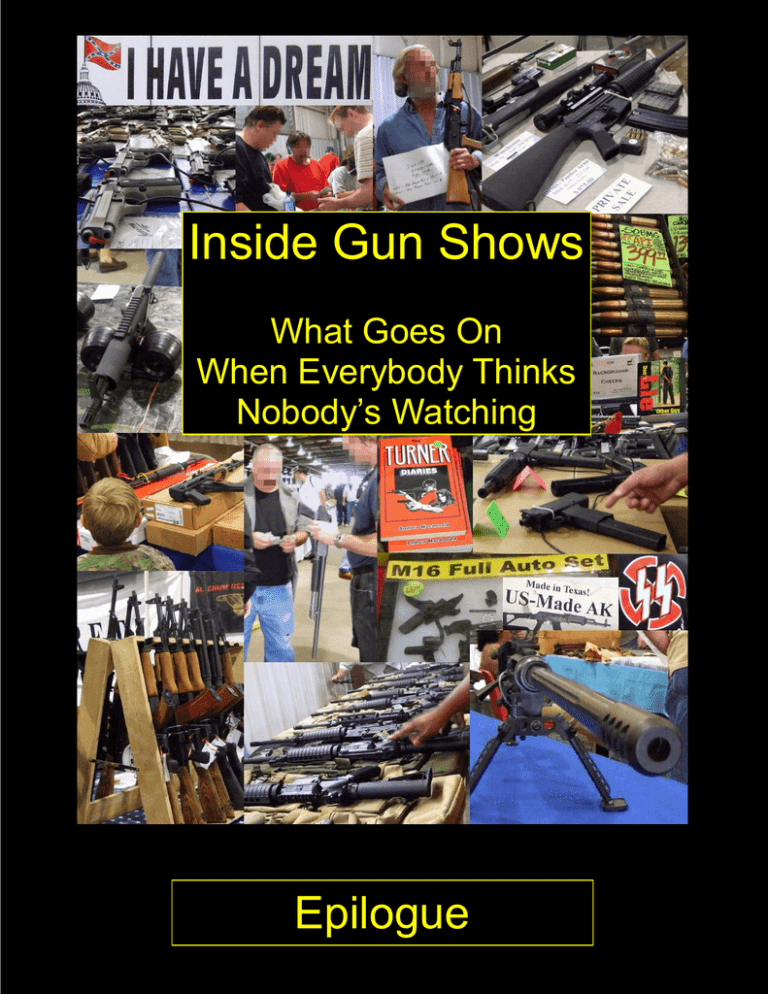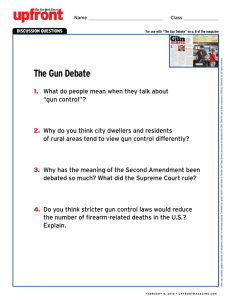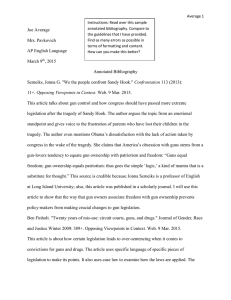
Inside Gun Shows
What Goes On
When Everybody Thinks
Nobody’s Watching
Epilogue
Inside Gun Shows
What Goes on
When Everybody Thinks
Nobody’s Watching
Garen Wintemute, MD, MPH
Violence Prevention Research Program
Department of Emergency Medicine
UC Davis School of Medicine
2315 Stockton Blvd.
Sacramento, CA 95817
© 2009 by Garen Wintemute, MD, MPH
All rights reserved. Published September 2009.
Epilogue © 2010 by Garen Wintemute, MD, MPH
All rights reserved. Published March 2010.
Copies of the full report may be downloaded and related video may be
viewed at http://www.ucdmc.ucdavis.edu/vprp.
Epilogue
In February 2010, I attended a Crossroads of the West gun show
at the Arizona State Fairgrounds in Phoenix. The purpose of the
trip was to test some possibilities for future research. A significant change in the operation of the show was immediately obvious, however, and other changes became apparent over the course
of the day. To describe the prevalence and scope of these developments, I present here an update on each of the Phoenix observations made in the photo-essay portion of Inside Gun Shows.
The updates are illustrated by the relevant pages from the initial
report (I did not bring a camera into the February show). The
document concludes with a brief comment on why the changes
might have occurred and what their significance might be.
1
Inside Gun Shows
The open space just inside the entrance to Crossroads of the West
gun shows at the Arizona State Fairgrounds had been perhaps the
largest and most active marketplace for undocumented private
party gun sales in the United States. Dozens of sellers were present at any one time. By December 2008, however, signs had
been posted stating “ABSOLUTELY NO GUN SALES IN THIS
AREA!” This was partly an exercise in displacement, as a reduced group of buyers and sellers congregated less than 50 yards
away.
In February 2010, a central marketplace no longer existed. Sandwich boards displayed the “ABSOLUTELY NO SALES” signs,
and while some negotiations did occur, they were uncommon.
Half a dozen times over the day, I returned to the area where the
marketplace had been and saw no one selling guns. Few people
even had them; at times, the still-substantial group of people
standing in or passing through the area gave no indication that the
event was a gun show. Over 10 minutes of continuous observation at about 2:30 on a Saturday afternoon I observed perhaps a
dozen people with guns, only three of whom had signs indicating
that they had guns for sale. All three were passing through the
area, not stopped with their guns displayed in front of them as in
the past, and one was on his way out of the show.
Within the show area itself, private parties walking the aisles with
guns for sale were still in evidence, and probably not much less
so than previously. But they were not concentrated in any one
place, and there was no one transporting multiple guns for sale in
a cart or similar vehicle—a common sight at prior shows. Private
party vendors who had rented table space were still numerous;
one posted signs reading “Private Sale. No Tax Collected. No
Background Checks. Arizona Resident.”
Scattered about the parking lot near the entrance to the show were
large signs reading “SALES ONLY INSIDE THE GUN SHOW
AREA ITSELF.” While attendees were entering and leaving the
show with guns for sale, no one had taken up a position in the
parking lot to display an inventory.
2
Epilogue
JG Sales of Prescott, Arizona, stood
out at previous shows for the volume
of business it did in inexpensive long
guns and bulk ammunition. In times
past, crowds of purchasers sometimes
elbowed each other for room at the
sales counter. In February 2010, JG
was present but had few customers
and displayed an inventory that was
perhaps one-third the size seen previously.
Joeken Firearms, an Arizona specialty
assembler, manufacturer, and retailer
of AK pistols and rifles and MAC
pistols, had a large display at prior
shows with perhaps 50 to 100 firearms on display. They had recently
introduced an AK pistol described as
“the shortest production AK on the
market.” In February 2010, their display was reduced by perhaps 75%,
and no AK pistols were visible.
One-Eyed Jack, a Class III licensed retailer selling at shows in
Arizona and Nevada, specialized in .50 BMG rifles, assault
weapons, and machine guns. He was not present at the show in
February 2010. (Nor was he at the most recent prior Phoenix
show I attended, in December 2008).
3
Inside Gun Shows
This vendor is a regular at Phoenix gun shows, and on the day
depicted in the photographs was selling AR pistols, and AR and
AK rifles, as a private party. In February 2010 he was present,
but had posted a federal firearms license and did not have AR
pistols for sale. He did have three MAC pistols on display,
along with AR and AK rifles.
This unlicensed vendor had also been observed at several prior
Phoenix shows. On the day of the photographs he had approximately 40 handguns on display and sold several of them, always
for cash and without documentation. Near the end of the day, he
sold two Glock pistols to four men who pooled their cash to buy
the guns and left the show shortly thereafter carrying eight handguns between them. As they left, they were observed by two
Phoenix Police Department Gang Unit officers, one of whom
remarked, “They‟ll just take „em out on the street and sell „em.”
This vendor was not present in February 2010.
At a prior show, these two men completed what appeared to be the straw
purchase of an AK rifle at a large federally licensed retailer. Other possible straw purchases were observed at
this retailer over the course of the project. This retailer was not present at
the February 2010 gun show.
4
Epilogue
At a different prior show, this couple
completed an apparent straw purchase at a large federally licensed
retailer. This retailer was present in
February 2010, but its display had
been reduced by about half.
Previously, several vendors stocked pistols resembling the Colt
Model 1911 that appeared to be destined for customers in Mexico. Many were in .38 caliber, the more powerful .45 caliber is
standard for these guns in the United States but is illegal in Mexico. These display cases, filled with essentially the same inventory, were still present in February 2010 at a large licensed retailer—a pawnbroker. As I was noting this, a young woman
completed the purchase of a new AK rifle from this pawnbroker
while the young man with her tended a stroller.
Over the course of the Inside Gun Shows project, this couple was
observed selling body armor not just in Phoenix, where they
were invariably in attendance, but from San Francisco to Dallas.
In February 2010 they were doing a brisk business.
5
Inside Gun Shows
Very pointed and in some cases frankly racist commentary on the
results of the 2008 presidential election was for sale just a few
weeks later at a Crossroads show in December. No such materials, whether referring to President Obama or to others, were seen
in February 2010.
This man, seen at every Phoenix gun show during the project,
was described by the Southern Poverty Law Center as “one of the
largest dealers of white supremacist paraphernalia and World War
II era Nazi memorabilia in the western United States.”1 In the
past, he prominently displayed new and historical Nazi materials
and neo-Confederacy items; his array of flags was visible from
the other side of the building. This appeared to conflict with the
promoter‟s prohibition on “items glorifying Nazism.” He was
present in February 2010, but the flags had been taken down.
(One was wrapped around a column that supported the roof but
was not visible at a distance.) Both new and historical Nazi
materials were still for sale but were much reduced in quantity.
Comment
We do not know why these changes occurred. Several reasons
may apply, differentially in individual cases. Gun sales, increasing in late 2008 and much of 2009 in what the industry described
as a “gun buying panic”2 incited by Barack Obama‟s election,
have since declined. There is some seasonal variability to gun
sales, and February is an off-peak time. The disappearance of
vendors may simply reflect the ordinary coming and going of
individual participants in a system of commerce. But it is worth
noting that the Bureau of Alcohol, Tobacco, Firearms and Explosives has expanded its enforcement activities in the Southwest,
partly in an effort to interdict cross-border trafficking in firearms.3 The Violence Prevention Research Program has published
6
Epilogue
two studies that involved Crossroads gun shows in Phoenix: a scientific journal article in 20074 and Inside Gun Shows in September 2009. In November 2009, television station KSAZ, the Fox
network affiliate in Phoenix, aired a story on gun shows that included a probing interview with the president of Crossroads. 5
The disappearance of the central marketplace for undocumented
gun sales may reduce the ability of gun shows at the Arizona
State Fairgrounds to serve as an efficient source of guns for criminal use. The private party gun market still operates, but it has become geographically diffuse. This introduces an element of inefficiency to efforts to acquire multiple guns rapidly through private
party sales, and therefore probably has its greatest impact on gun
trafficking operations. The apparent absence of vendors who participated in high risk or illegal sales is also a positive development, though other corrupt retailers may replace them.
Despite these changes, the February show was well patronized; at
times it was difficult to move through the aisles because of the
density of people in attendance. As discussed in Inside Gun
Shows and elsewhere,4 it appears to be possible to change the behavior of gun shows in ways that decrease the risk they present to
the public‟s safety, without putting them out of business. Bob
Templeton, president of Crossroads, also heads the National Association of Arms Shows. It will be important to determine
whether these changes at Phoenix gun shows spread to shows
elsewhere, progress locally, remain stable, or disappear.
ATF Special Agent Bill Newell and
Bob Templeton of Crossroads Gun
Shows on the Fox News broadcast
“Effects of the Gun Show Loophole,” November 14, 2009.
References
1.
2.
3.
4.
5.
Holthouse D. The merchant of Glendale: an Arizonan who says he was in
the Hitler Youth has become one of the largest dealers of racist memorabilia in the West. Intelligence Report 2008;129:20-21.
December „09 NICS checks total in top 5. Firearms Business 2010;17
(2):2.
Project Gunrunner: the Southwest border initiative. Washington, DC:
Bureau of Alcohol, Tobacco, Firearms and Explosives: 2009. Available at
http://www.atf.gov/publications/download/p/atf-p-3317-6.pdf.
Wintemute GJ. Gun shows across a multistate American gun market:
observational evidence of the effects of regulatory policies. Injury Prevention 2007;13:150-156.
Effects of the gun show loophole. Available at http://
www.myfoxphoenix.com/dpp/news/only_on_fox/
gun_show_loophole_11_14_2009.
7


